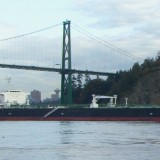I think the Harper budget is a plus for the environment.
It comes in a way from a roundabout look at things.
The government will take habitat protection out of the Fisheries Act and will put developments on a “fast track”.
Why is this good news?
Because we now have it in writing what the bastards are up to!
It really all comes down to the Environmental Assessment hearings that are used to give the government the right to do what they intended to do all along. What they’re supposed to do, of course, is make us all feel as if we’ve had input which, of course, we haven’t and never will have.
It goes to the root of the matter. I daresay that 90%+ of those attending those meetings want to have a say as to whether the project is a wise one that the public can support on its merits; instead, it’s only to hear what we have to say on various environmental aspects. The reality is, no matter what this committee says, the government will do as it pleases.
Now, as we digest that, we realize that the project is going ahead and always was going ahead and that the meetings are shams – expensive shams.
This all goes back to the Kemano II of the mid 80s where the long and the short of it was that Alcan wanted to take even more water out of the Nechako River through which critical sockeye runs pass on their way to the Stuart system to spawn.
The issues were beyond debate. DFO scientists, two years before the deal was struck, did a careful study by several of their best scientists who said NO WAY! It was a long, thorough effort that never saw the light of day until one of the scientists, by then retired, leaked a copy to me in about 1993, long after the deal had been made. In short both governments, including the Feds that ordered it, kept the report secret.
Not only did the federal government sit on the report, they passed an order-in-council removing the need of an Environmental Assessment. I rake over these old coals because this was the start of the politicization of the Environment and Fisheries departments which continues to this day. (A good example is the obligation to both monitor fish farms and shill for them at the same time).
Until now, the Harper government has let us believe that the current the hearings are a vehicle to get public opinion on projects. With this latest enunciation of policy, the environmental assessment process is taking too long, say the governments, thus must be shortened! It takes the breath away for it simply states we don’t give a good goddamn what the commissions report – we’re going ahead anyway!
We always thought as much but here it is a matter of government policy – first the approval, then environmental assessment, which is only for show.
Here is where it’s good news. We have an admission that fish habitat no longer matters and approval in principle means government support the entire way.
We now know this and can govern ourselves accordingly.
We know that the Enbridge pipelines and tanker traffic down our coast and through the Port of Vancouver are done deals and the only delays are those which would come anyway as Enbridge gets ready.
What then do we do?
We gird up our loins and get ready to fight.
We do this now because it’s time – and our cause is just.
I’ll say in a moment what we should do but first let’s review the problems:
The proposed Enbridge pipeline would traverse 1,100 km of BC through the Rockies, Coast Range and Great Bear Rainforest, some of the most rugged and untouched wilderness in the world with unbelievable wild life.
It would cross over 1,000 rivers and streams, several vital for large salmon runs.
The company, Enbridge, has a shocking record for spills and leaks, 811 since 1998. They have demonstrated that the bitumen from the Tar Sands is all but impossible to clean up as their spill in the populated state of Michigan into the Kalamazoo River clearly demonstrates.
The company and government talk about thousands of jobs and billions of dollars – it’s all bullshit. All but low paying jobs would go to crews from out of province – specialized labour forces. The money goes to Alberta and the Feds.
But ask yourself this: even if there was billions of dollars and millions of jobs – would you trade our heritage for this?
It gets down to this: the territory the pipelines go through, where spills will occur, means that even attempts to clean up a spill would be useless.
There is no point having a pipeline unless there is tanker traffic, estimated to be 200-300 tankers per year. Here is an article from long time fisherman John Brajcich, whose family have been commercial fishermen on BC’s north and central coast – where oil super tankers would pass – for some eighty years. Mr. Brajcich writes:
As a fisherman who has worked his whole life on the coast of BC, I have many concerns about oil tankers leaving Kitamaat (proper spelling double “a” and it means ‘people of the snow’).
All of the discussions, I have heard, have been about concerns regarding pipeline ruptures and what can happen on the land route. My concern is what will happen if there is a loaded oil tanker heading to sea and it hits a reef or shore or breaks up causing another Exxon Valdez event/catastrophe.
Our family has a long history in the area. My father started fishing there in the 30’s and in 1949, at the age of 13, I went out on his seine boat. In 1957 I became a Captain of a seiner and I fished the area for over 50 years, usually from 5 -20 weeks per year. At present my son operates our family’s seiner and continues to fish this area. Our combined family’s presence in this area is over 80 years.
I have been hired by Fisheries and Oceans Canada to participate in stock assessments for salmon and herring. In 1968 we were hired by Shell Oil Company to assist in the positioning of Sedco’s drill rig in Hecate Straits.
We have spent so much time in Fisheries and Oceans Canada designated area 6 that lifelong friends – the late Alan Hall of Kitamaat and Johnny Clifton of Hartley Bay – were made. I have seen the waterfall at Butedale frozen solid, bone dry and running so hard you could not tie up your boat.
With our family’s 80 plus years of fishing in the Whale Channel area we have firsthand knowledge of tides, weather, types of fish and bird life. The area from Kitamaat to Hecate Straits is designated Area 6, by Fisheries and Oceans Canada and is the most consistent salmon producing region in British Columbia with runs in the odd and even years.
In Area 6 there is:
- Within the Central coast area 128 salmon bearing streams
- Kitasu Bay to McInnes Island is a major herring spawning ground
- All 5 species of salmon, herring, crab, mussels, clams, abalone, prawns, eulachons, pilchards, hake, geoduck, mackerel, halibut cod, pollock, otters, eagles and many birds, plus whales and porpoises
- Tides that fluctuate over 20 feet causing currents of up to 5 knots
- Being a region of heavy snow and glaciers there are very strong freshets from May to the end of July
- The outflow winds from Douglas Channel can be extreme during summer and winter
- Weather in Hecate Straits – because of strong complex currents, waves have been recorded up to 30 metres. The highest wind gusts recorded for November, December, January, February and March is 180 -190-plus km per hour.
If a ship enters Laredo Channel from Hecate Straits at McInnes Island the tanker would have Lenard Shoal and Moody Bank at the bottom of Aristazabl Island. On the east side of Aristazabl Island there are 2 very dangerous rocks known as Wilson and Moorhouse. Campania Sound is also a very treacherous body of water from Dupont Island to Hecate Straits.
There are many rocks and to name a few, Bortwick, Cort, Ness, Evans, Cliff and Janion also Yares Shoal. This area is a minefield of reefs. These rocks are spread out between Rennison Island, Banks Island and Campania Island. This route would be extremely dangerous to tanker traffic. Using the Otter Pass route, Nepean rock becomes a very prominent problem for ships’ travel.
Should a major oil spill occur I feel an oil boom would not be able to contain it because of the velocity of the current in this area and the oil could travel 20-50 miles in one 6 hour tide. This area is not the Mediterranean or a lagoon.
If a spill occurred in Laredo Channel the herring spawning area at Kitasu Bay to Price Island could be totally destroyed, possibly forever. The eel grass which the herring need to spawn on could be wiped out. Some years over 10,000 tons of herring spawn in this area.
A spill at freshet time would be the most devastating. Due to the differences of its viscosity, salt water is heavier and would be lower and the fresh water being lighter, becomes a shallow layer at the surface. The juvenile salmon live in this fresh water layer as they migrate to sea. The juvenile salmon jump like raindrops and if they were migrating in a spill area the oil could wipe out an entire run. Some streams could become barren of salmon.
I have tried to point out, so people know, the dangers of the entire marine area and what could happen if there is ever a spill. I have spent my entire life around Princess Royal Island and the vicinity. I personally am totally opposed to the Kitamaat terminal for oil tankers.
A spill on the coast is inevitable and the consequences horrific.
What must we do?
Let’s not pussyfoot – there must be and will be civil disobedience. This will be a long way from civilization thus will require careful planning.
First, we need a “ways and means” committee to galvanize the huge number of angry citizens and to start, I would recommend that First Nations and all environmental groups come together.
It’s impossible to get groups to amalgamate because each has different specialists. The fact is, however, that all environmental groups and, at last count, 131 First Nations are all against this pipeline/tanker traffic.
It would be wrong of me to second guess what recommendations would be made by such a group, although I have a suggestion – create a ‘Club” called the I’LL BE THERE CLUB, meaning that the member will be part of the protest.
Secondly – and here I would ask First Nations to lead – we must formulate a plan to protest when construction begins and as it goes along. I call upon First Nations leadership because they are already well organized and deeply committed.
It will take time – and leadership.
The time to start is right now.
My new book, The Home Stretch which outlines what various religions have to say about Souls, Near Death Experiences and how they think they’ll get us the best deal. The book is online and can be downloaded on your computer, Kindle, Kobo or iPad from www.kobo.com or www.kindle.com at the ridiculously low price of $9.99










